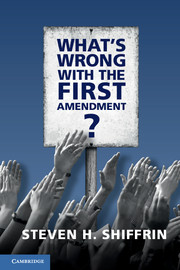11 - What Next?
from PART III
Published online by Cambridge University Press: 05 September 2016
Summary
I have argued that the US Supreme Court has wrongly privileged speech over important values including privacy, justice, racial and sexual equality, animal protection, public health, and democracy. I have also argued that it has given short shrift to the importance of protecting dissent and has displayed a conspicuous lack of vigilance in affording constitutional protection to religious minorities. My primary complaint has been the almost total absence of a sense of proportion in accommodating conflicting values. The sin has been speech worship in Part I and for the most part deference to authority and order in Part II.
With respect to speech worship, I should hasten to observe that I have not argued free speech should have no role to play in accommodating the values I have discussed. Even in the area of commercial speech, which I believe should receive no liberty protection under the First Amendment, I think it obvious that government could not restrict advertising employing Republican celebrities while permitting the employment of Democratic celebrities. The First Amendment houses an equality value limiting government regulation of otherwise unprotected speech. Leaving commercial speech aside, free speech can be unduly restricted in clashes with privacy, fair trial, racial and sexual equality, entertainment violence, and campaign finance. For example, regulation of speech involving racial and sexual equality risks censorship of speech merely because we think it is wrong-headed; we have a long history of censoring speech in new media for fear of its harmful effects; campaign finance legislation is too often designed as a form of incumbent protection.
Nonetheless, there is no excuse for the mechanical privileging of free speech over other important values. It may be inappropriate to impose prior restraints on the press, but prosecutors and police should not generally be free to release incriminating information outside the trial process. Elementary considerations of privacy and dignity should preclude the successful invocation of the First Amendment to protect the intentional infliction of emotional distress at funerals or the publication of the names of rape victims without consent. Principles of equal citizenship and avoiding harm to the vulnerable counsel that the toleration of appropriately defined racist speech and pornography is unjustifiable.
- Type
- Chapter
- Information
- What's Wrong with the First Amendment , pp. 184 - 192Publisher: Cambridge University PressPrint publication year: 2016

